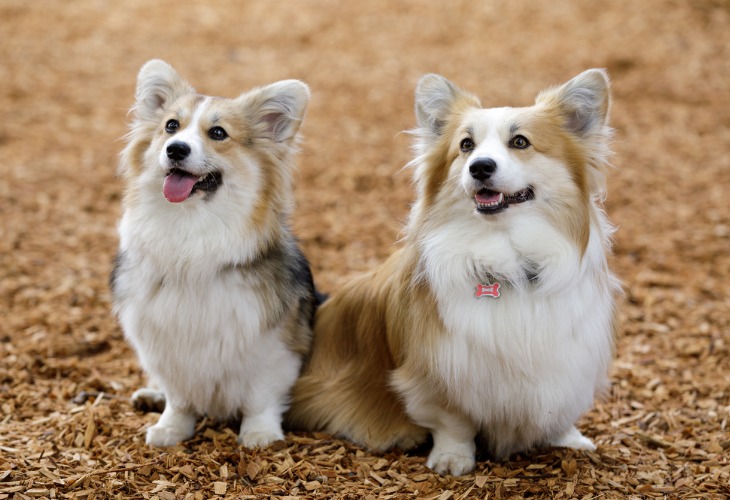Breed standard: AKC I Size: Small I Average lifespan: 12+ years I Temperament: Affectionate and full of energy I Coat length: Medium I Origin: Wales.
The Welsh Corgi is a very popular dog breed, now widespread throughout the world. They are intelligent, affectionate, and full of energy.
Evolution of the Welsh Corgi: from its origins to the present
Two different Welsh Corgi breeds
According to the Fédération Cynologique Internationale (or the International Canine Federation in English), there are two distinct Welsh Corgi breeds. These breeds are the Pembroke Welsh Corgi and the Cardigan Welsh Corgi. Although they differ in some ways, both of the breeds originated in Wales and were herding dogs.
While no one is sure of the exact meaning of the word “corgi”, it comes from Welsh. Some believe that the name “corgi” refers to its origin as a herding dog. Others believe that the name signifies “dwarf dog”, referring to the breed’s small size. It is believed that the Welsh Corgi originated from various small Spitz dog breeds. For a long time, Welsh Corgis were herding dogs. This means that they guarded and guided herds of cows, geese, and ponies. In addition, they watched over their family’s farm and hunted pests.
The Welsh Corgi: a royal dog
In England, when Queen Elizabeth II was not yet queen, her father, King George VI, gifted her two Pembroke Welsh Corgi puppies. They were named Dookie and Jane. She really fell for them. At the age of 18, she adopted Susan, a dog who never left her side, even on her honeymoon. She became passionate about the Welsh Corgi breed. Queen Elizabeth II went on to own dozens of Pembroke Welsh Corgis at the same time. The breed then gained popularity in both England and the United States.
In 1934, the The Kennel Club officially recognized the Pembroke Welsh Corgi and the Cardigan Welsh Corgi as different breeds.

Character
Qualities
The Welsh Corgi is a very intelligent dog breed. It is known to be full of energy and very jovial. This particularly affectionate breed loves to be the center of attention. They really enjoy playing with their owners.
This dog is particularly fond of children. They are kind and attentive to them. Additionally, the breed can sociable with other animals, as long as they have been introduced to other animals at a young age. Although Welsh Corgis have a tendancy to bark when in the presence of strangers, it’s not because they hate strangers. Instead, it’s because they are watching over their home.
This lovely breed is an energetic little ball of fur. They love to exercise and love participating in a variety of different activities. Some activities that they particularly enjoy include herding and agility competitions. Additionally, Welsh Corgis enjoy running and going for walks. Other types of games that you can play with your dog are obedience games and fetch.
Are there any downsides to having a Welsh Corgi?
Although Welsh Corgis have many great qualities, they can also be stubborn at times. Furthermore, they are known to be less calm and docile than other breeds. With that being said, it is not very difficult to train this dog breed.
Similar to other herding dog breeds, Welsh Corgis may have a tendency to bite your ankles. However, this is not done maliciously. If they receive proper training from a young age, this type of behavior can be discouraged.
Training
Although Welsh Corgis are not the calmest dogs in the world, they are still relatively easy to train. When your first start to train your dog, don’t hesitate to be firm. Establishing a good dynamic with your Welsh Corgi and working on obedience lessons will truly benefit your dog. Keep in mind that this dog breed tends to bark a lot in different situations.
The Welsh Corgi is a small dog that learns best through positive reinforcement. Additionally, they are known to learn quite quickly. Keep in mind, though, that this breed has a tendency to gain weight easier than other dog breeds. Therefore, make sure to not give too many treats during training sessions. You can also find other ways to reward your dog for their good behavior.
It’s important that this breed socializes with other animals from a young age. Take the opportunity to introduce your dog to other dogs, cats, and people outside the family. This will help your Welsh Corgi feel more comfortable in new situations. When your Welsh Corgi is still a puppy, you can also introduce them to other types of noises and environments. This ultimately reduces their nervousness and anxiety.

Physical characteristics
The Welsh Corgi is a small working dog breed with a fox-like appearance. Although their legs are short, their bodies are long. The ears of the Pembroke Welsh Corgi are small and straight. With that being said, their ears are larger than those of the Cardigan Welsh Corgi breed.
Tail
One of the ways that you can distinguish a Pembroke Welsh Corgi from a Cardigan Welsh Corgi is by looking at their backs. The Pembroke breed has no tail, while the Cardigan breed has a bushy tail similar to a fox. When Pembroke Welsh Corgis are born with tails, some owners prefer to dock the tail. However, this practice is forbidden in a few countries such as France.
Body
Their body is robust and agile. They have large skull and a pointed muzzle. Although Welsh Corgis are small, they look strong.
When it comes to the breed’s coat, it is medium and straight. The undercoat is fairly dense. The coat can be fawn, red, charcoal fawn or black and tan. All colors except pure white are allowed in the Welsh Corgi. White markings can sometimes be found on their legs, neck and chest. Regarding their eyes, they are round, medium-sized, and hazel. The Welsh Corgi is about 30 cm tall (around 1 ft) and weighs around 10 kg (around 22 lbs).

Caring for the Welsh Corgi
When Welsh Corgis shed, they tend to lose a lot of fur. For this reason, it’s important to brush them daily during shedding periods. When they aren’t shedding, you can brush them once or twice a week. You can give them a bath once every three months.
If you hear the sound of their claws clicking on the floor, this is probably the time to clip them. It’s best to brush your Welsh Corgi’s teeth two or three times a week to prevent tartar build-up and bad breath. When you see dirt or tears in their eyes, you should clean them. They should also have their ears cleaned weekly.
Feeding
Welsh Corgis love eating and have a tendency to stuff themselves. Therefore, it is important to watch their diet and give them balanced meals. The meals should be adapted to their age, physical activity, and health condition.
Health
The Welsh Corgi is fairly healthy. Their thick coat protects them from bad weather and low temperatures. However, this breed is susceptible to certain health issues. Some of these include progressive retinal atrophy, intervertebral disc disease (IVDD), epilepsy, hip dysplasia, and von Willebrand disease (a type of blood clotting disorder).
Tips for raising a Welsh Corgi
This breed can easily adapt to life in an apartment. However, it’s important to keep in mind that Welsh Corgis were originally herding dogs. Despite their small size, they are quite athletic. They require exercise and need to play outdoors. It’s best to go on long daily walks. In addition, because they were herding dogs in the past, they make good watchdogs for you and your family members. They will bark to alert you of strange noises or intruders.
The Welsh Corgi at a glance
Size: 25 to 30 cm (around 9 to 12 in).
Weight: 10 to 12 kg (around 22 to 27 lbs).
Health: Overall, the Welsh Corgi is a robust and healthy breed. However, the breed is susceptible to certain health issues. Some of these include progressive retinal atrophy, intervertebral disc disease (IVDD), epilepsy, hip dysplasia, and von Willebrand disease (a type of blood clotting disorder). As Welsh Corgis are also prone to obesity, it’s important to keep an eye on their weight.
Average lifespan: between 11 and 13 years.
Are Welsh Corgis good with children? They are particularly fond of children. This dog breed is very friendly, playful, kind, and caring towards them.
How easy are Welsh Corgis to train? Although Welsh Corgis are known to be quite stubborn, training them is relatively easy. However, it’s important to be firm and keep a positive attitude. One of the best ways to train them is through playing.

